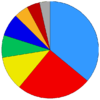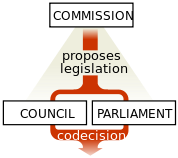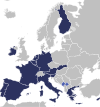European People's Party
| European People's Party Europäische Volkspartei Parti Populaire européen Partito Popolare Europeo Partido Popular Europeo Europese Volkspartij Il-Partit Popolari Ewropew Europejska Partia Ludowa Európai Néppárt Partido Popular Europeu Avrupa Halk Partisi Европейска народна партия Páirtí Pobail na hEorpa Evropská lidová strana |
|
|---|---|
 |
|
| President | Wilfried Martens |
| Founded | 1976 |
| Headquarters | Rue du Commerce / Handelsstraat 10, Brussels, B-1000 |
| Ideology | Liberal conservatism, Christian democracy, Pro-Europeanism |
| International affiliation | Centrist Democrat International, International Democrat Union |
| European Parliament Group | Group of the European People's Party |
| Official colours | Blue, gold |
| Website | |
| http://www.epp.eu/ | |
| Politics of the European Union Political parties Elections |
|
The European People's Party (EPP) is a centre-right European political party. Founded in 1976, the EPP has 72 member-parties from 39 countries, 15 EU and 5 non-EU heads of state and government, 13 European Commissioners (including the President), the President of the European Council and the largest group in the European Parliament with 265 members.
Contents |
History
| European Union |
 This article is part of the series: |
|
Policies and issues
|
|
Foreign relations
|
According to its website, the EPP is "the family of the political centre-right, whose roots run deep in the history and civilization of the European continent and has pioneered the European project from its inception."[1]
EPP traces its ancestry to the Nouvelles Equipes Internationales in 1946[2] or 1948,[3] via the European Union of Christian Democrats founded in 1965,[2] although it has been argued that it ultimately descends from the Secretariat International des partis démocratiques d'inspiration chrétienne founded in 1925.[3]
EPP manifesto
The EPP 2009 manifesto calls for:
- Creation of new jobs. Continuing reforms and investment in education, lifelong learning and employment in order to create opportunities for everyone.[4]
- Protectionism must be averted. Fiscal and monetary policies must be coordinated.[4]
- Increasing transparency and surveillance on financial markets.[4]
- Making Europe the market leader in green technology.[4]
- Increasing the share of renewable energy to at least 20% of the energy mix by 2020.[4]
- Family-friendly flexibility for working parents. Better childcare and housing must be provided, family-friendly fiscal policies introduced, and parental leave should be encouraged.[4]
- Europe should find a strategy to attract skilled workers from the rest of the world to make Europe’s economy more competitive, more dynamic and more knowledge driven.[4]
Structure
Organisation
Its current President is former Belgian Prime Minister Wilfried Martens. Martens was re-elected President at the December 2009 EPP Congress in Bonn for a 3-year term. In the same Congress, Commissioners Antonio Tajani (PdL) and Michel Barnier (UMP), were also elected as well as Finnish Deputy Prime Minister Jyrki Katainen (KOK), Hungarian Prime Minister Viktor Orbán (Fidesz), German State Secretary Peter Hintze (CDU), Irish opposition leader Enda Kenny (FG), Bulgarian MP Rumiana Jeleva (GERB), and MEPs Jacek Saryusz-Wolski (PO), Mario David (PSD), and Corien Wortmann-Kool (CDA). Also, Commission President Jose Manuel Barroso, Council President Herman Van Rompuy, Parliament President Jerzy Buzek, and EPP Group Chairman Joseph Daul (UMP) are ex officio EPP Vice-Presidents. CSU politician Ingo Freidrich is the Treasurer.
Activity
The European People's Party is active horizontally with the main EU institutions.
By invitation of the EPP President, the President of the European Commission, the President of the European Council, the President of the European Parliament and the EPP heads of state and government (and leaders of the opposition) customarily meet a few hours prior to the Summit of the European Council at the 'Académie Royale' in Brussels for the EPP Summit to form common positions.
For the past two years the Party organizes on a regular basis EPP Ministerial meetings prior to the meetings of the Council of the European Union. The meetings of EPP Ministers are usually hosted in the Party headquarters. The EPP organizes a total of ten different Ministerial meetings: Foreign Affairs, Economy and Finance, Employment and Social Affairs, Industry, Defence, Agriculture, Environment, Justice and Home Affairs, Transport, Energy.
The EPP also organizes on a ad hoc basis meetings with its affiliated members of the European Commission and it also invites individual Commissioners to the EPP Summit meetings and/or to EPP Ministerial meetings.
Following the 2007 amendment of the the EU Regulation that governs Europarties, the EPP is solely responsible for organizing the pan-European campaign for the European elections every five years. According to the Lisbon Treaty, the EPP (like all Europarties) must present, as part of the campaign for the European elections, a candidate for President of the European Commission; the EPP already did this prior to the ratification of the Lisbon Treaty, by endorsing for a second term Jose Manuel Barroso in April 2009.
In the European institutions
The EPP currently holds the Presidencies of all three main EU institutions: the European Commission led by President José Manuel Barroso (PSD), ), the European Council led by Herman Van Rompuy (CD&V) - who was nominated by EPP as its first permanent President - and the European Parliament led by President Jerzy Buzek (PO).
European Council
The EPP currently has 15 out of the 27 heads of State or Government in the European Council:
- Iveta Radičová (Slovakia, SDKU-DS)
- Angela Merkel (Germany, CDU)
- Nicolas Sarkozy (France, UMP)
- Silvio Berlusconi (Italy, PdL)
- Donald Tusk (Poland, PO)
- Emil Boc (Romania, PD-L)
- Jan Peter Balkenende (Netherlands, CDA)
- Fredrik Reinfeldt (Sweden, MSP)
- Viktor Orban (Hungary, Fidesz)
- Boyko Borisov (Bulgaria, GERB)
- Valdis Dombrovskis (Latvia, JL)
- Lawrence Gonzi (Malta, PN)
- Jean-Claude Juncker (Luxembourg, CSV)
- Andrius Kubilius (Lithuania, TS-LKD)
- Yves Leterme (Belgium, CD&V)
The EPP also has 6 heads of State or Government who do not normally take part in the European Council since that responsibility belongs to the other leaders of their countries: Bronisław Komorowski (Poland, PO), Christian Wulff (Germany, CDU), Pál Schmitt (Hungary, Fidesz), Aníbal Cavaco Silva (Portugal, PSD), François Fillon (France, UMP) and Traian Băsescu (Romania, PD-L).
European Commission
The EPP during its 2009 European elections campaign, re-nominated at its April 2009 Congress in Warsaw Jose Manuel Barroso as its candidate for re-election as Commission President if it won the elections. Because the EPP won, Barroso's nomination was endorsed by the European Council and was elected by an absolute majority in the European Parliament for a second term.
On November 27, 2009, Barroso unveiled the 'Barroso II Commission' which includes a total of 13 (out of 27) EPP Commissioners. In January 2010 Rumiana Jeleva was replaced by Kristalina Georgieva:
- Jose Manuel Barroso: President
- Viviane Reding: Justice, Fundamental Rights and Citizenship. Vice-President of the Commission
- Antonio Tajani: Industry and Entrepreneurship. Vice-President of the Commission (also EPP Vice President)
- Michel Barnier: Internal Market and Services (also EPP Vice President)
- Dacian Ciolos: Agriculture and Rural Development
- John Dalli: Health and Consumer Policy
- Johannes Hahn: Regional Policy
- Connie Hedegaard: Climate Action
- Kristalina Georgieva: International Cooperation, Humanitarian Aid and Crisis Response
- Janusz Lewandowski: Budget and Financial Programming
- Günther Oettinger: Energy
- Andris Piebalgs: Development
- Algirdas Šemeta: Taxation and Customs Union, Audit and Anti-Fraud.
European Parliament
In the European Parliament the EPP has the largest parliamentary group - the EPP Group - with 265 MEPs. In every European election, candidates elected on lists of member-parties of the EPP are obliged to join the EPP Group in the European Parliament. In the current parliamentary term, the EPP is the only Europarty that has a fully corresponding parliamentary group. According to the statutes of the EPP, the Chairman of the EPP Group is an ex officio Vice President of the EPP.
Beyond the EU
EPP, through its associate parties, also has 5 heads of State or Government from non-EU countries: Jadranka Kosor (Croatia, HDZ), Recep Tayyip Erdoğan (Turkey, AKP), Sali Berisha (Albania, DP), Nikola Gruevski (Macedonia, VMRO-DPMNE), and Mikheil Saakashvili (Georgia, UNM).
EPP also has parliamentary groups in the parliamentary assemblies of the Council of Europe, Chaired by Luca Volontè (Italy, UDC), and the OSCE, Chaired by Walburga Habsburg Douglas (Sweden, MSP).
In recent years, the EPP has been developing beyond Europe bilateral relations with major conservative and like-minded parties. Due its firm transatlantic orientation, North America has been a particular focus of the Party's international activities. The EPP has close relations with the International Republican Institute (IRI).
The EPP is the European wing of two centre-right global multilateral organizations: the Christian Democrat International (CDI) and the International Democrat Union (IDU). EPP is also a member of the European Movement international.
Elected Representatives of Member Parties
European institutions
At present the European People's Party is the largest political grouping in the European Parliament and amongst national leaders.
| Organisation | Institution | Number of seats |
|---|---|---|
| European Commission |
13 / 27
|
|
| Council (Heads of Government) |
15 / 27
|
|
| European Council (Participation in Government) |
18 / 27
|
|
| European Parliament |
265 / 736
|
|
| Parliamentary Assembly |
105 / 318
|
EPP's Official Think Tank
Following the 2008 revision of the EU Regulation that governs European political parties allowing the creation of European foundations affiliated to Europarties, the EPP established in the same year its official foundation/think tank, the Centre for European Studies (CES). The CES includes as members all the major national think tanks and foundations affiliated to EPP member parties: Konrad Adenauer Foundation (CDU), Hanns Seidel Foundation (CSU), Foundation for Analysis and Social Studies (PP), Constantinos Karamanlis Institute for Democracy (ND), Jarl Hjalmarson Foundation (MOD), and others. During the 2009 European elections campaign, the CES launched a successful web-based campaign module 'tellbarroso.eu' to support Jose Manuel Barroso, the EPP candidate, for re-election as Commission President.
Member parties
| Part of a series on |
| Christian democracy |
|---|
|
Parties
List of Christian Democratic parties
Centrist Democrat InternationalChristian Democratic Organization of America
European People's PartyEuropean Christian Political Movement
European Democratic Party |
|
Ideas
Social conservatism
Market economy Social market economy Christian corporatism Communitarianism Human dignity Stewardship Sphere sovereignty Subsidiarity Distributism Catholic social teaching Neo-Calvinism · Neo-Thomism |
|
Documents
Stone Lectures
Rerum Novarum Graves de Communi Re Quadragesimo Anno Laborem Exercens Sollicitudi Rei Socialis Centesimus Annus |
|
People
|
| Politics portal |
| Part of a series on |
| Conservatism |
|---|
|
Schools
Cultural conservatism
Economic conservatism · Fiscal conservatism · Green conservatism Liberal conservatism · Libertarian conservatism National conservatism · Neoconservatism Paleoconservatism · Social conservatism Traditionalist conservatism |
|
Concepts
|
|
People
Henry St John
Edmund Burke · John Reeves Joseph de Maistre · Louis Bonald François Chateaubriand Adam Müller · Juan Donoso Cortés Sir Robert Peel · Benjamin Disraeli Sir John A. Macdonald Sir George-Étienne Cartier Otto von Bismarck · Lord Salisbury Sir Winston Churchill Carl Schmitt · Leo Strauss Michael Oakeshott Erik von Kuehnelt-Leddihn · Russell Kirk William F. Buckley, Jr. · Barry Goldwater Margaret Thatcher · Roger Scruton |
|
Organizations
Conservative political parties
International Democrat Union International Young Democrat Union Asia Pacific Democrat Union European People's Party European Democrats AECR |
|
Religious
|
|
National variants
|
|
Related topics
Reactionary · Right-wing politics
Toryism · Carlism · Aristocracy Capitalism · Neo-liberalism Thatcherism 'And' theory of conservatism Conservative Revolutionary movement Tea Party movement |
| Politics Portal |
- Österreichische Volkspartei (ÖVP) (Austrian Peoples Party)
 Flanders
Flanders
- Christen-Democratisch en Vlaams (CD&V) (Christian Democratic & Flemish)
 Wallonia
Wallonia
- Centre Démocrate Humaniste (CDH) (Humanist Democratic Centre)
- Демократи за силна България (Democrats for a Strong Bulgaria)
- Съюз на Демократичните Сили (Union of the Democratic Forces)
- Граждани за европейско развитие на България (Citizens for European Development of Bulgaria)
- Демократическа партия (DP) (Democratic Party)
- Български Земеделски Народен Съюз - Народен Съюз (Bulgarian Agrarian People's Union - People's Union)
- Δημοκρατικός Συναγερμός (Democratic Rally)
- Křesťanská a demokratická unie - Československá strana lidová (KDU-CSL) (Christian and Democratic Union - Czechoslovak People's Party)
- Det Konservative Folkeparti (KF) (Conservative People's Party)
- Kristendemokraterne (Christian Democrats)
- Isamaa ja Res Publica Liit (Union of Pro Patria and Res Publica)
- Kansallinen Kokoomus (KOK) (National Coalition Party)
- Union pour un Mouvement Populaire (UMP) (Union for a Popular Movement)
- Christlich Demokratische Union (CDU) (Christian Democratic Union)
- Christlich-Soziale Union in Bayern (CSU) (Christian Social Union of Bavaria)
- Νέα Δημοκρατία (ND) (New Democracy)
- Fidesz – Magyar Polgári Szövetség (Hungarian Civic Union)
- Magyar Demokrata Fórum (MDF) (Hungarian Democratic Forum) – currently suspended and likely to be expelled, as the only MDF MEP joined the European Conservatives and Reformists group instead of the EPP group[5]
- Kereszténydemokrata Néppárt (KDNP) (Christian Democratic People's Party)
- Fine Gael (FG)
- Il Popolo della Libertà (PdL) (The People of Freedom)
- Unione di Centro (UdC) (Union of the Centre)
- Popolari UDEUR (UDEUR Populars)
- Tautas Partija (TP) (People's Party),
- Jaunais Laiks (JL) (New Era)
- Pilsoniskā Savienība (PS) (Citizen's Party)
- Tėvynės sąjunga - Lietuvos krikščionys demokratai (TS-LKD) (Homeland Union - Lithuanian Christian Democrats)
- Chrëschtlech Sozial Vollekspartei (CSV) (Christian-Social People's Party)
- Partit Nazzjonalista (PN) (Nationalist Party)
- Christen-Democratisch Appèl (CDA) (Christian Democratic Appeal)
- Platforma Obywatelska (PO) (Civic Platform)
- Polskie Stronnictwo Ludowe (PSL) (Polish Peasant Party)
- Partido Social Democrata (PSD) (Social Democratic Party)
- Centro Democrático e Social - Partido Popular (CDS-PP) (Social Democratic Centre - People's Party)
- Partidul Naţional Ţărănesc Creştin şi Democrat (PNŢCD) (Christian-Democratic National Peasants' Party)
- Partidul Democrat-Liberal (PD-L) (Democratic Liberal Party)
- Uniunea Democrată a Maghiarilor din România (UDMR) (Democratic Union of Hungarians in Romania)
- Slovenská demokratická a kresťanská únia - Demokratická strana (SDKÚ-DS) (Slovak Democratic and Christian Union - Democratic Party),
- Magyar Koalíció Pártja/Strana maďarskej koalície (SMK) (Party of Hungarian Coalition),
- Kresťanskodemokratické hnutie (KDH) (Christian Democratic Movement of Slovakia)
- Slovenska demokratska stranka (SDS) (Slovenian Democratic Party),
- Nova Slovenija Krščanska ljudska stranka (NSi) (New Slovenia)
- Slovenska ljudska stranka (SLS) (Slovenian People's Party)
- Partido Popular (PP) (People's Party)
- Unió Democràtica de Catalunya (Democratic Union of Catalonia)
- Moderata samlingspartiet (M or MSP) (Moderate Party),
- Kristdemokraterna (KD) (Christian Democrats)
Associate members
- Hrvatska demokratska zajednica (HDZ) (Croatian Democratic Union)
- Hrvatska seljačka stranka (HSS) (Croatian Peasant Party)
- Høyre (H) (Conservatives)
- Demokratska stranka Srbije (DSS) (Democratic Party of Serbia)
- Г17+ (G17 Plus)
- Christlichdemokratische Volkspartei (CVP) (Christian Democratic People's Party)
Observer members
- Partia Demokratike e Shqipërisë (Democratic Party of Albania)
- Biełaruski Narodny Front (BNF) (Belarusian Popular Front)
- Abjadnanaja Hramadzianskaja Partyja Biełarusi (AHP) (United Civil Party of Belarus)
-
- Stranka demokratske akcije (SDA) (Party of Democratic Action)
- Hrvatska demokratska zajednica Bosne i Hercegovine (HDZBiH) (The Croatian Democratic Union of Bosnia and Herzegovina)
- Partija demokratskog progresa RS (PDP) (Party of Democratic Progress of Republika Srpska)
- Suomen Kristillisdemokraatit (Christian Democrats)
- Ertiani Natsionaluri Modzraoba (ENM) (United National Movement)
- VMRO-DPMNE
- Südtiroler Volkspartei (South Tyrolese People's Party)
- Partidul Popular Creştin Democrat (Christian-Democratic People's Party)
- Partidul Liberal Democrat din Moldova (Liberal Democratic Party of Moldova)
- Kristelig Folkeparti (KrF) (Christian People's Party)
- Partito Democratico Cristiano Sammarinese (PDCS) (San Marinese Christian Democratic Party)
- Vajdasági Magyar Szövetség (VMSZ) (Alliance of Vojvodina Hungarians)
- Adalet ve Kalkınma Partisi (AKP) (Justice and Development Party)
- Народний Союз «Наша Україна» (NSNU) (People's Union "Our Ukraine")
- Народний Рух України (Rukh) (Narodnyi Rukh Ukrajiny, People's Movement of Ukraine)
- Всеукраїнське об'єднання "Батьківщина" (Vseukrayins'ke Obyednannya Bat’kivshchyna - All-Ukrainian Union "Fatherland")
References
- ↑ EPP | European People's Party
- ↑ 2.0 2.1 "Trans-European Party Groupings: Emergence of New and Alignment of Old Parties in the Light of Direct Elections to the European Parliament" by Paul-H Claeys and Nicole Loeb-Mayer, from "Government and Opposition", Volume 14, issue 4, page 455-478
- ↑ 3.0 3.1 "On the road towards transnational party cooperation in Europe" by Steven van Hecke in "European View", Volume 3, 2006, from the Centre for European Studies
- ↑ 4.0 4.1 4.2 4.3 4.4 4.5 4.6 EPP Manifesto – European Elections 2009
- ↑ Parties and Elections in Europe
External links
- European People's Party EPP portal site
- EPP Twitter page
- EPP Facebook page
- EPP Flickr page
- EPP YouTube page
- myEPP.eu private social network
- myEPP.tv webtv
- CES the EPP think-tank
- tellBarroso.eu - a 2009 EPP campaign initiative by its think-tank, CES
- EPP Group in the European Parliament
- EPP Group in the Committee of the Regions
- EPP Group in the Council of Europe parliamentary assembly
- EPP Youth (YEPP)
- EPP Students (EDS)
- EPP Women
- EPP Seniors (ESU)
- EPP SME Union
- EPP Workers (EUCDW)
|
|||||||||||||||||||





